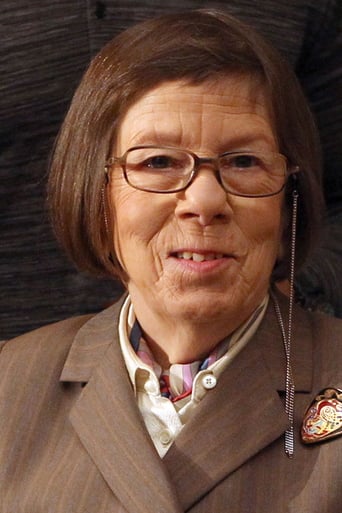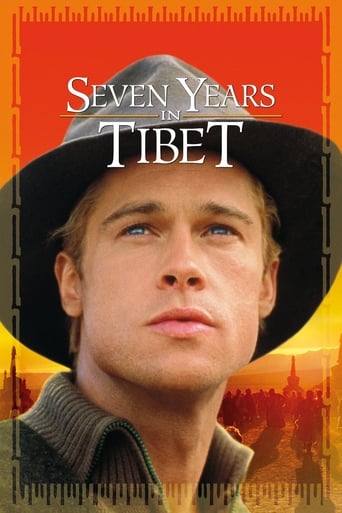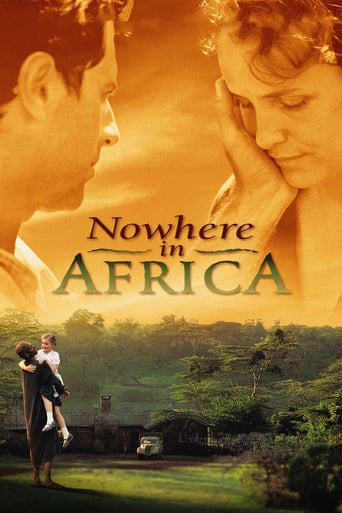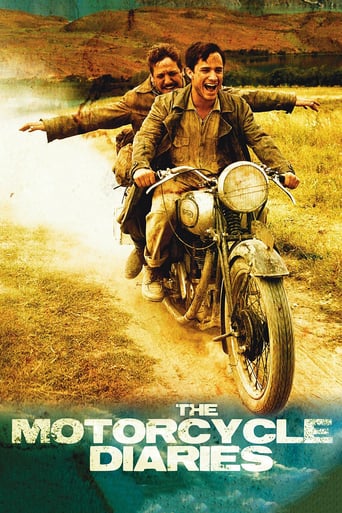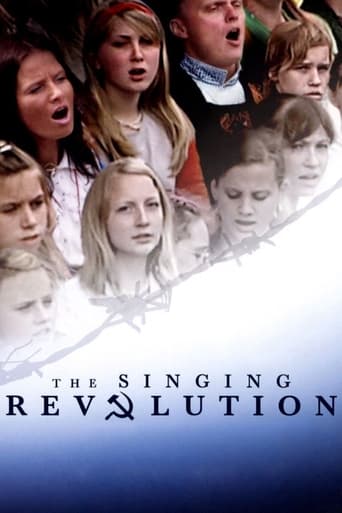
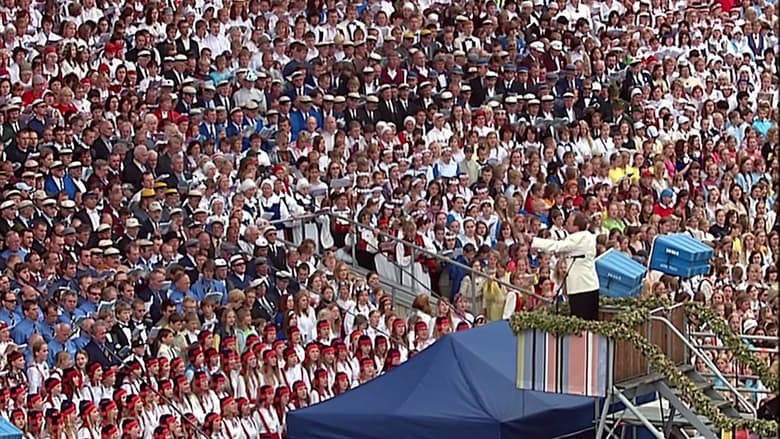
The Singing Revolution (2006)
Most people don't think about singing when they think about revolutions. But song was the weapon of choice when, between 1986 and 1991, Estonians sought to free themselves from decades of Soviet occupation. During those years, hundreds of thousands gathered in public to sing forbidden patriotic songs and to rally for independence. "The young people, without any political party, and without any politicians, just came together ... not only tens of thousands but hundreds of thousands ... to gather and to sing and to give this nation a new spirit," remarks Mart Laar, a Singing Revolution leader featured in the film and the first post-Soviet Prime Minister of Estonia. "This was the idea of the Singing Revolution." James Tusty and Maureen Castle Tusty's "The Singing Revolution" tells the moving story of how the Estonian people peacefully regained their freedom--and helped topple an empire along the way.
Watch Trailer
Cast
Similar titles

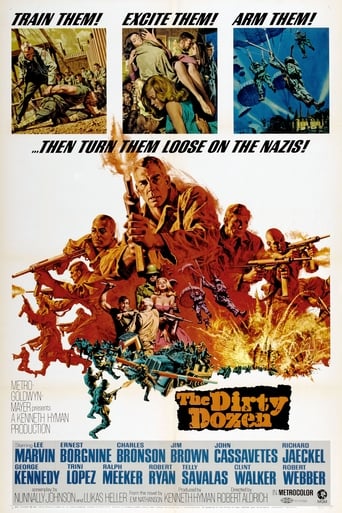
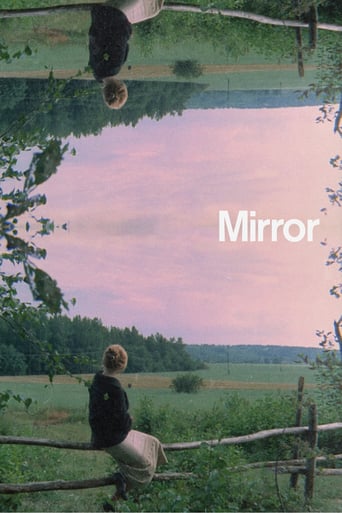
Reviews
Sorry, this movie sucks
Excellent but underrated film
I like movies that are aware of what they are selling... without [any] greater aspirations than to make people laugh and that's it.
Exactly the movie you think it is, but not the movie you want it to be.
This is a film about Estonian independence that occurred in the late 1980s and early 1990s--as the Communist Bloc began to fall apart. It's actually odd that very few films about this period are ever seen in the US--especially considering this meant an end to the very long and tense Cold War.The film begins with a history of Estonia in the 20th century. After gaining its independence following WWI, the country was at peace--that is until the evil pact between the USSR and Nazi Germany. This agreement allowed Stalin to invade and a period of very intense persecutions began. Deportations to Siberia and mass occurred to break the back of the country. Then, two years later, Germans invaded and occupied this tiny country. And, towards the end of the war, the Soviets returned and very harsh repression returned. For the next 45 years or so, the nation would have all symbols of nationalism removed and a strong move to turn the citizens into Soviet citizens began. Despite this, there was a very, very small and quiet sense that Estonia would one day rise again. With a slight easing of free speech rights during the rule of Gorbachev, these hidden desires began to slowly be expressed. Much of the film consists of showing the steps that occurred with these first murmurs for freedom to the actual declaration of independence.So how did singing come into all this? Well, at times the link was rather tenuous in the film. It seems that the earliest forms of protest (even before Gorbachev) was in the nation's singing festivals--and there the people sang nationalistic songs which had been forbidden. And, on one occasion, one out of every three Estonians appeared at the festival to sing--something that is pretty hard to comprehend when you think about it.All in all, a very inspiring documentary about freedom and bravery. Considering that a huge percentage of the nation had been murdered or deported during the Soviet era (about 1/3 of the nation), the fact that they stood up for freedom is all the more impressive.The film is super-inspiring. It was narrated by Linda Hunt, but mostly is consists of Estonians talking on camera about the singing revolution--and this is most fitting. Additionally, archival footage and footage of Estonia today is used to tell this very touching story. The most important part, however, is at the very end--when a brief biographical statement is given for those who participated in the film--and their sacrifices.
I rented this documentary from Netflix not expecting a whole lot, but I was so wrong and it was so well done and deserved more recognition and praise. This movie is a very moving documentary that shows how little Estonia defied the Soviet Union by singing. The Singing Revolution tells the true story how Estonia through song got their independence from the Soviet Union.Now the questions must be asked how is this possible, how can singing change the world, well Estonia can show you how. Using music and interviews this documentary is a good view from anyone who loves a good and inspiring story.
It's been a few hundred years since the US had to figuratively sing for its independence, but less than 2 decades since Estonians finally shed the Soviet yoke and found freedom. That the country just south of Finland and between Germany and Russia achieved their freedom not by force but as it were by culture is more remarkable than its million people facing off a country of hundreds of million. Thus forms the outline of a dynamic documentary about Estonian revolution.The thousands of Estonians who met every five years in Tartu, as many as 30,000, sang patriotic songs despite cruel occupations by Germany and Soviet Russia. The symbolic resistance was accompanied by some deft diplomacy during Mikhail Gorbachev's glasnost or freedom of speech and the break up of the USSR in the early 1990's.James Trusty and Maureen Castle Trusty's documentary assembles archival footage of the struggle in the 20th century, uses the usual talking heads, some of whom were freedom fighters, and has the good sense to have an understated Linda Hunt narration. When these innocent throngs sing their nationalist songs, cinemaphiles can't but think of the French singing La Marseillaise at Rick's Cafe in Casablanca.It all works to the extent that you will never forget the little country that could.
I'm pretty generous with films which I like -- if I'm really enjoying something, I'll usually give it a 10. Some people save 10 for that rare film that comes along every couple of years, and I wish I did that, so I could bestow a rare 10 on this film. But, 10 is as high as it goes.I saw it at Cinema Sundays at the Charles, here in Baltimore. As the director, who presented the film, said about persuading people to see the movie, "Let's see, it's a film about a singing revolution in Estonia, what shall we do instead?" But, he said, once people see it they love it. Certainly we did -- there was applause for two-thirds of the credits, and then a long, partially standing, ovation for the director after the credits were over.The film opens with history -- the Soviet occupation of Estonia under Stalin, then the Nazi occupation, then after that the Soviets again.Then it goes to the present day -- a man is conducting what seems to be a chorus of thousands of people, of all ages, in a song -- the subtitles tell you it's a patriotic song. The shots of the faces of the singers and the audience are warm and moving -- most of the people are smiling --some in the audience are holding back tears. The physical beauty of the people and the setting, combined with the welling voices and harmonies, are powerful, entrancing.The movie then describes, through incredible archival footage combined with interviews with people who participated on various sides, Estonia's use of song and non-violence to precipitate the downfall of the Soviet Union.This is a story and a half -- and it's much more powerful because you know, incredibly, it really happened. This is a story of people who, after thousands of years on the land, were occupied by Germany in the 1200s and were essential serfs for 600 years. In 1869 their awakening nationalism led to the first singing festival (Laulupidu).In 1918 the country declared independence, but after about 20 years the land was again occupied, this time by Bolsheviks. The land was then briefly occupied by Nazi Germany, and then became part of the Union of Soviet Socialist Republics.In 1947, the Singing Festival was reborn. To mark the occasion, a composer wrote a tune for a patriotic poem, which translates as "Land of my fathers, land that I love" in English, and it became a musical symbol of the desire for independence of the Estonian people. But in 1969, the 100th anniversary of the singing festival, the Soviets forbade the singing of "Land of my fathers." Nevertheless, the choir, having sung their Soviet songs, refused to leave the stage, and 20,000 audience members began singing "Land of my fathers" in defiance of the authorities. Eventually the Soviets allowed the song's composer onto the stage to conduct the song, as though it was their idea all along.That act of defiance -- that singing of a song -- marked the start of a non-violent revolution which brought independence to Estonia and led directly to the breakup of the Soviet Union. The movie details the various times when things could have gone wrong -- the times when the Estonians might have gone too far and precipitated a bloodbath. But, through a combination of bravery and a stubborn refusal either to back down or provoke, Estonian nationalists created a unique revolution -- the Singing Revolution.This is a gorgeous story -- a story of persistence, bravery, sacrifice. This is a movie which will appeal to the Left and the Right. It's a movie which makes a case for nationalism. It's a movie which will inspire you.
